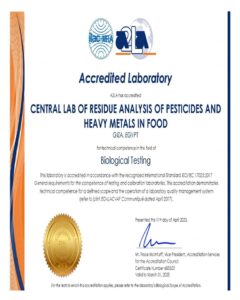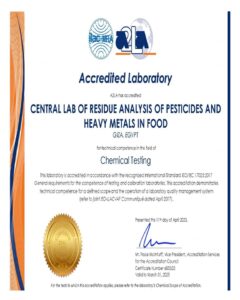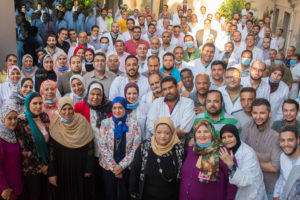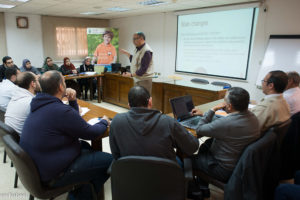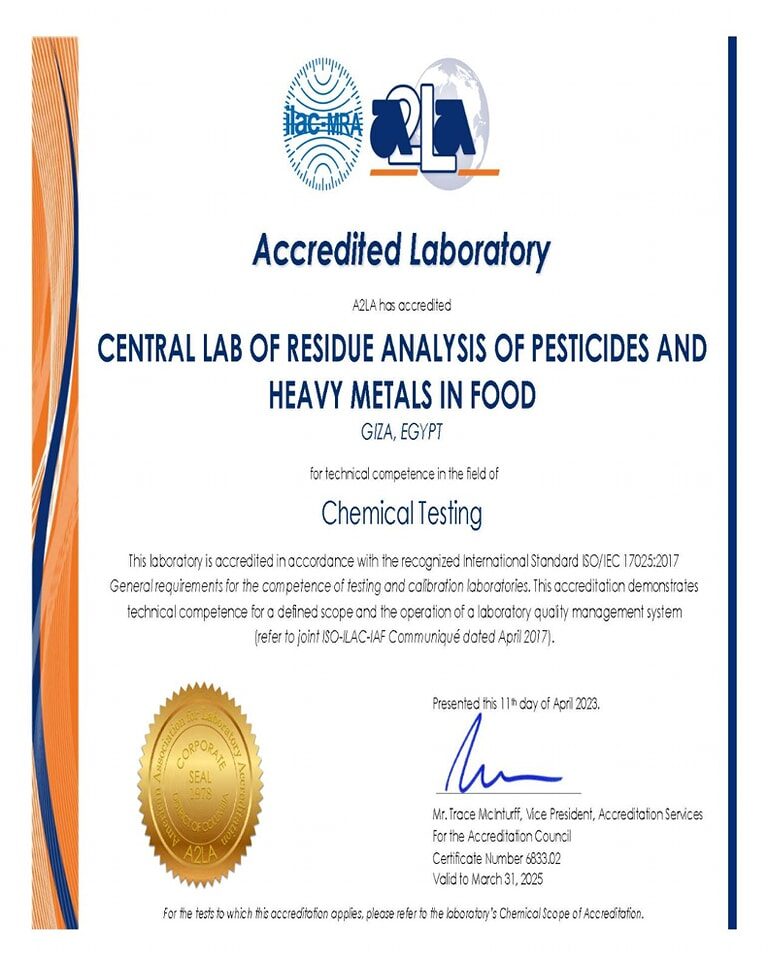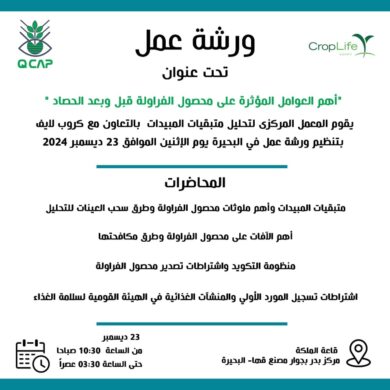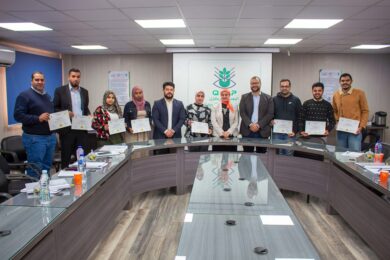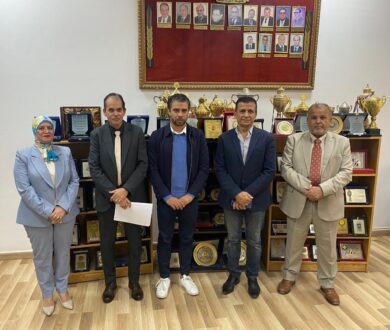The Central Lab for Pesticide Residues passed the renewal of accreditation in ISO 17025:2017 from the American international accreditation body A2LA.
(Q-Cap) continues to achieve achievements and begins the year with a new achievement
===========================
Within the framework of the directives of His Excellency Mr. Al-Sayyid Al-Quseir, Minister of Agriculture and Land Reclamation, and the efforts of the Ministry of Agriculture and the Agricultural Research Center to support Egyptian exports as well as protect the Egyptian consumer through the laboratory’s participation in the food control system by analyzing pollutants, and since the central laboratory for analyzing pesticide residues and heavy metals in foods (Q-Cap One of the most important of these entities, which is considered to have a great international and international standing, as it is considered one of the largest laboratories in the world in its field, according to the European Union’s classification of it in the first distinguished category, since 2008 until now. It is also considered the first laboratory in the Middle East to provide these services in a comprehensive manner. Integrated.
Prof. Dr. Adel Abdel Azim, head of the Agricultural Research Center, stated that the central laboratory for analyzing pesticide residues and heavy metals in food has passed the renewal of international accreditation for ISO (17025/2017) from the American Accreditation Authority A2LA, and the laboratory and new analysis methods have been approved by the affiliated expert. The American accreditation body A2LA used Live Meeting via the Internet platform, where the quality system, analysis methods, and efficiency of the laboratory’s workers were examined and audited. The laboratory passed the examination and audit to obtain renewal of accreditation with efficiency and distinction.
In the same context, Prof. Dr. Hind Abdullah stated that the renewal of accreditation comes within the framework of the laboratory’s continuation of achieving many achievements in its field of work. She also added that the laboratory continues its efforts and tireless steps in providing its services with the highest quality by continuing to obtain international accreditations that give it It has great weight and increases the confidence of its customers and the confidence of international markets in its results, as well as the requirements of some customers for export to the American market. She also indicated that the laboratory adopted new methods of analysis and pollutants in the various departments during this accreditation, exceeding 56 chemical and microbial compounds in food, water and soil. The most important of these methods is the method of analyzing dithiocarbamate in the pesticide residues department, and the addition of some heavy elements such as potassium and phosphorus. The analysis of other compounds has also been approved, such as Histamine, sugars, and vitamins in foods, and ergot in wheat, in the Mycotoxins, Additives, and Food Quality Department. Some analysis methods have also been approved in the Veterinary Drugs Department and the Food Contact Materials Department, in addition to microbes, with new analysis methods that are shorter in time, the most important of which are PCR, Pseudomonas aeruginosa, GMO, and animal ID.
In the same context, Abdullah indicated that the laboratory and all its various departments are part of the auditing and examination system of accreditation bodies.
It should be noted that the factory contributes to achieving a production system for the purpose of export and promoting this production in foreign markets, to increase the market share of Egyptian agricultural exports in those markets, and to achieve development goals through the analytical, training and advisory services it provides, contracts and cooperation protocols, workshops and participation in conferences for workers. In the field of production, export and food processing, which supports the national economy.
It is worth noting that the American Association for Laboratory Accreditation (A2LA) is among the largest accreditation bodies in the world and is the only independent, 501(c)3, non-profit and internationally recognized accreditation body in the United States that provides a full range of conformity assessment accreditation, which includes services many.
Founded in 1978 as a public service membership association, A2LA has more than 4,000 accredited certifications representing all 50 U.S. states and more than 50 countries globally.
#Food Safety
#Pollutant_Analysis
#Agricultural_exports
#Food Industry
#training programs
#Pesticide_Residues_Laboratory_Qcap#
(Q-Cap) continues to achieve achievements and begins the year with a new achievement
===========================
Within the framework of the directives of His Excellency Mr. Al-Sayyid Al-Quseir, Minister of Agriculture and Land Reclamation, and the efforts of the Ministry of Agriculture and the Agricultural Research Center to support Egyptian exports as well as protect the Egyptian consumer through the laboratory’s participation in the food control system by analyzing pollutants, and since the central laboratory for analyzing pesticide residues and heavy metals in foods (Q-Cap One of the most important of these entities, which is considered to have a great international and international standing, as it is considered one of the largest laboratories in the world in its field, according to the European Union’s classification of it in the first distinguished category, since 2008 until now. It is also considered the first laboratory in the Middle East to provide these services in a comprehensive manner. Integrated.
Prof. Dr. Adel Abdel Azim, head of the Agricultural Research Center, stated that the central laboratory for analyzing pesticide residues and heavy metals in food has passed the renewal of international accreditation for ISO (17025/2017) from the American Accreditation Authority A2LA, and the laboratory and new analysis methods have been approved by the affiliated expert. The American accreditation body A2LA used Live Meeting via the Internet platform, where the quality system, analysis methods, and efficiency of the laboratory’s workers were examined and audited. The laboratory passed the examination and audit to obtain renewal of accreditation with efficiency and distinction.
In the same context, Prof. Dr. Hind Abdullah stated that the renewal of accreditation comes within the framework of the laboratory’s continuation of achieving many achievements in its field of work. She also added that the laboratory continues its efforts and tireless steps in providing its services with the highest quality by continuing to obtain international accreditations that give it It has great weight and increases the confidence of its customers and the confidence of international markets in its results, as well as the requirements of some customers for export to the American market. She also indicated that the laboratory adopted new methods of analysis and pollutants in the various departments during this accreditation, exceeding 56 chemical and microbial compounds in food, water and soil. The most important of these methods is the method of analyzing dithiocarbamate in the pesticide residues department, and the addition of some heavy elements such as potassium and phosphorus. The analysis of other compounds has also been approved, such as Histamine, sugars, and vitamins in foods, and ergot in wheat, in the Mycotoxins, Additives, and Food Quality Department. Some analysis methods have also been approved in the Veterinary Drugs Department and the Food Contact Materials Department, in addition to microbes, with new analysis methods that are shorter in time, the most important of which are PCR, Pseudomonas aeruginosa, GMO, and animal ID.
In the same context, Abdullah indicated that the laboratory and all its various departments are part of the auditing and examination system of accreditation bodies.
It should be noted that the factory contributes to achieving a production system for the purpose of export and promoting this production in foreign markets, to increase the market share of Egyptian agricultural exports in those markets, and to achieve development goals through the analytical, training and advisory services it provides, contracts and cooperation protocols, workshops and participation in conferences for workers. In the field of production, export and food processing, which supports the national economy.
It is worth noting that the American Association for Laboratory Accreditation (A2LA) is among the largest accreditation bodies in the world and is the only independent, 501(c)3, non-profit and internationally recognized accreditation body in the United States that provides a full range of conformity assessment accreditation, which includes services many.
Founded in 1978 as a public service membership association, A2LA has more than 4,000 accredited certifications representing all 50 U.S. states and more than 50 countries globally.
#Food Safety
#Pollutant_Analysis
#Agricultural_exports
#Food Industry
#training programs
#Pesticide_Residues_Laboratory_Qcap#
